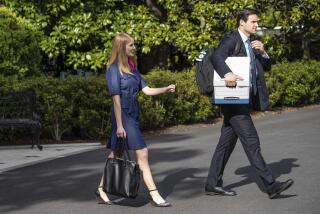Altered Memos for North, Hall Tells Court
- Share via
WASHINGTON — Fawn Hall, the former secretary of Oliver L. North, said in federal court Wednesday that she systematically altered top-secret documents at North’s direction in November, 1986, a day before Justice Department investigators began interrogating him about his role in the Iran-Contra scandal.
Although her testimony at North’s trial largely paralleled her account at televised congressional hearings two years ago, Hall added some new details, including assertions that North had joked about “going to jail.”
Also, she told prosecutor John W. Keker that she had no “qualms” about shredding original copies of the altered documents because she trusted North and “I knew there was a reason why we were doing this.”
Perks Up Jurors
The appearance of the attractive blonde perked up jurors on a drowsy spring afternoon and caused the judge to lose his composure momentarily.
As Hall took her place in the witness chair, U.S. District Judge Gerhard A. Gesell forgot to give her the standard admonition he has given to 23 previous witnesses. A few minutes into her testimony, Keker gently reminded the 78-year-old jurist of his oversight.
Gesell, grinning broadly, leaned forward and told Hall that she was only to testify about her first-hand knowledge of events and not to base any of her answers on North’s own testimony at the congressional hearings in July, 1987.
Tells of Instructions
Hall, 29, who is now working on a book in Los Angeles, said that North gave her instructions on Nov. 21, 1986, “to make some changes in a few System Four documents,” the most sensitive category of records kept by the National Security Council, where North was a staff official.
She said that the documents turned out to be a set of memos North had written the year before to his boss at the time, National Security Adviser Robert C. McFarlane, detailing the troubles of Nicaragua’s rebels in the wake of a congressional cutoff in U.S. aid.
McFarlane, in trial testimony last week, referred to the documents as “problem memos” because he said they indicated that North was actively raising private funds for the Contras and helping them purchase military equipment--activities that McFarlane believed were questionable in light of the congressional prohibition.
But McFarlane said that North insisted he simply had written the memos too loosely and that he actually was complying with the mandate of Congress.
Hall, testifying under a grant of immunity from prosecution, said that North marked sections for her to retype, mainly to remove references to private fund-raising efforts for the Contras and sometimes to substitute language saying that the White House must obtain new funding from Congress.
After a new memo was created, Hall said, North often would direct her to put a check mark in a box labeled “approve,” as McFarlane had done. McFarlane had left the White House 11 months earlier.
When asked if North had joked about going to jail, Hall said: “Yes, Col. North made jokes and there were jokes made about that. . . . He had a great sense of humor.”
Calls Action Unusual
“This was a very unusual thing, wasn’t it, to change original System Four documents?” Keker asked Hall.
“I had not done it before,” Hall replied.
Her testimony supported at least three of 12 criminal charges on which North is being tried, including obstruction of Congress and a presidential inquiry and destruction of official records.
Hall said that, when former President Ronald Reagan fired North and sealed off his office during an initial investigation into diversion of Iranian arms-sale profits to the Nicaraguan rebels, she smuggled out to North other sensitive documents that had been overlooked in their earlier shredding.
Earlier Wednesday, Willard I. Zucker, an American-born lawyer living in Geneva, testified how he had set up secret Swiss bank accounts for North and two associates, former Air Force Maj. Gen. Richard V. Secord and Albert A. Hakim, an Iranian-born businessmen, to handle the flow of Iranian arms-sale profits and other funds for the Contras.
More to Read
Sign up for Essential California
The most important California stories and recommendations in your inbox every morning.
You may occasionally receive promotional content from the Los Angeles Times.













